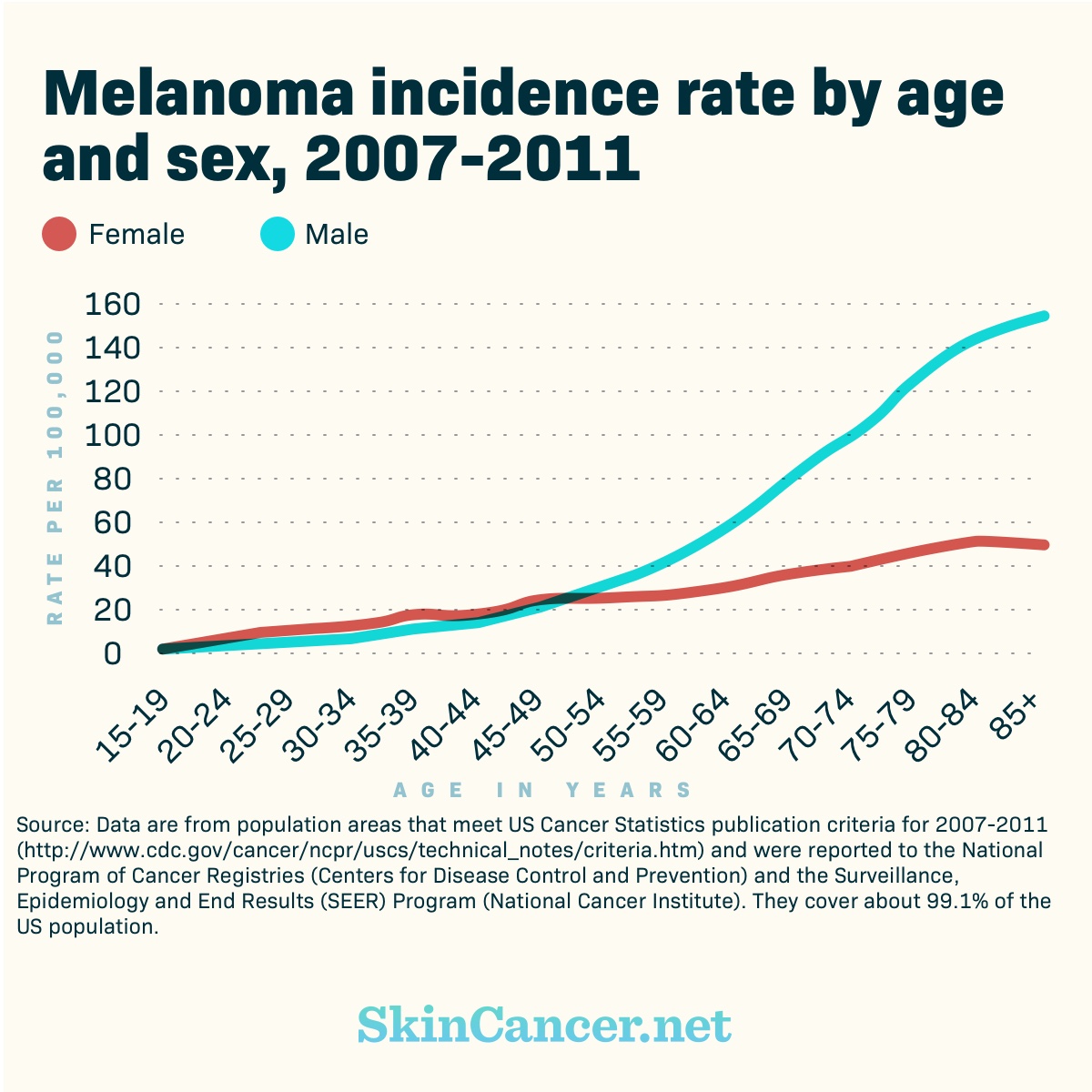Skin Cancer in Men
Reviewed by: HU Medical Review Board | Last reviewed November 2019. | Last updated: November 2019
There are some risk factors that are not controllable, and the way certain cancers affect the sexes is one of these. Light-skinned men are more likely than anyone else to get skin cancer, and the risk goes up with age. Death from skin cancer is rare, but men are twice as likely to die of melanoma than women.1
How common is skin cancer in men?
In 2019, it is estimated that approximately 57,220 new cases of melanoma will be diagnosed in men, and 39,260 new cases will be diagnosed in women.2
Whites are more likely than non-whites to develop melanoma; it is approximately more than 20 times more common in white individuals than in African Americans.2 Non-melanoma skin cancers are also more common in white men than other demographics.3,4
Younger women are slightly more likely to develop melanoma than younger men, but the trend reverses at age 50 (Figure).2,5 By age 65, the incidence (number of new cases) is twice as high in men than women. By age 85, the incidence is three times higher.
Figure 1. Melanoma incidence rate by age and sex
Why is skin cancer more common in men?
Sun exposure is the most important risk factor for skin cancer. Historically, men may have more sun exposure due to outdoor work.5 Long-term sun exposure seems to be an especially strong risk factor for squamous cell carcinoma.
Additionally, men are less diligent about protecting themselves from the sun. Wearing long pants is the most common way that men protect their skin from the sun—and only one third of men do that.6 About 25% of men stay in the shade and a mere 16% use sunscreen.6 Few men wear wide-brimmed hats (7%) or a long-sleeved shirt (8%) for sun protection. Half of young men—and two-thirds of young white men—have been sunburned in the past year.6 Having a history of severe sunburn increases the risk of melanoma almost 2.5 times for men.7
There is a growing belief that a main cause of sex differences in skin cancer may be because of factors in men’s skin itself. Men’s skin differs from women’s skin: it has more collagen, and is thicker, with less fat under it.1 All of these factors make the skin more likely to be damaged by UV rays, thus increasing the risk of developing skin cancer.1
What should I look for?
In men, melanoma is most likely to grow on the chest and back.5 Melanoma is often a pigmented (dark) lesion that is larger than a normal mole. The melanoma may have an asymmetrical shape or uneven color.
It is also important to recognize signs of basal cell carcinoma, squamous cell carcinoma, and the precancer actinic keratosis. If you notice a questionable lesion, make an appointment to see your primary care physician or a dermatologist.
The fact is, it is hard to get a good look at your own back, behind your knees, or the tops of your ears. If you are at high risk of skin cancer, regular skin exams by your doctor may be important.8,9 Skin cancer is usually curable when it is caught early.
How common is it for men to die from skin cancer?
The best numbers about skin cancer survival are about melanoma. Melanoma is not as common as BCC or SCC, but cases of melanoma are tracked in cancer registries, unlike BCC and SCC.
The overall five-year survival rate for melanoma is 92.2 percent.3 Cancer stage at diagnosis is a primary factor in survival rates and treatment options. In 2019, approximately 4,740 men will die from melanoma, compared with 2,490 women.11 For men, this means a rate of 3.7 for every 100,000 diagnoses of melanoma.3 The mortality rate is highest in white men.3
Survival depends on a variety of factors, but catching it early is important. Melanoma is most treatable in its early stages, as survival rates get lower once the disease reaches the lymph nodes, and even lower once the disease has metastasized, or travels to distant organs.
